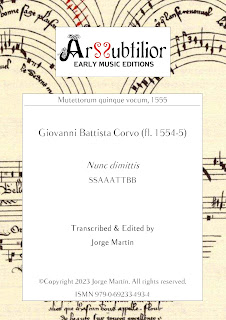We are proud to release the complete edition of the Masses in the manuscript I-MOe MS {alpha}.M.1.1 (Biblioteca Estense Universitaria, Modena). This choirbook was probably copied in Ferrara around 1559-1560, and contains five Masses that were clearly dedicated to the Duke of Ferrara, Alfonso II d'Este (1533-1597): the composers were all linked to the Ferrarese court: Francesco della (or "dalla") Viola (†1568), Luzzasco Luzzaschi (c. 1545-1607) and Adrian Willaert (c. 1495-1562).
The five Masses of the I-MOe MS {alpha}.M.1.1 are unica. Furthermore, the Masses by della Viola and Luzzaschi are in fact their only extant masses.
The most represented composer in this manuscript, Francesco della Viola, has three five-voice masses in it: Missa Veni Sancte Spiritus, Missa Ad beneplacitum and Missa Lauda Sion. All of them are works beautifully crafted and surprising for various reasons: the Missa Veni Sancte Spiritus has in the Sanctus and Agnus Dei a cantus firmus dedicated to the Duke of Ferrara with the words Inclitae Ferrariae Alphonso Duci Quinto laeta longa saecula. The Agnus Dei I and II are scored for six voices, and the outstanding Agnus Dei III is scored for seven voices with a non-indicated canon by contrary motion of the cantus firmus. The Missa Ad beneplacitum begins with five voices in the Kyrie and the Gloria and increases the number of voices to six in the Credo, seven in the Sanctus and eight in the Agnus Dei.
The Missa Ad beneplacitum by Luzzasco Luzzaschi, probably composed freely (or based on one or various unknown models) is scored for five voices except for the Agnus Dei, which is scored for six voices.
The most famous composer on I-MOe MS {alpha}.M.1.1 is Adrian Willaert. The Missa Mittit ad virginem (probably one of his last Masses, if not the last), copied only in this manuscript, is an spectacular work based on his own motet. In the last Agnus Dei, where the number of voices is increased to seven, a thrilling homage to Alfonso II d'Este can be found again, including a mensuration canon between two voices with a plainchant with the words Pater Alphonso annue Secundo Duci Ferrariae.
You can buy or download this score here. You can purchase our scores for the price you want to support Ars Subtilior Editions!
A Book of
Masses for Alfonso II d’Este, Duke of Ferrara
I-MOe MS
{alpha}.M.1.1 (Biblioteca Estense Universitaria, Modena)
|
Francesco della Viola (†1568)
|
Missa Veni Sancte Spiritus
|
SATTB
|
Buy/Download
|
|
Francesco della Viola (†1568)
|
Missa Ad beneplacitum
|
SATTB
|
Buy/Download
|
|
Francesco della Viola (†1568)
|
Missa Lauda Sion
|
SATTB
|
Buy/Download
|
|
Luzzasco Luzzaschi (c. 1545-1607)
|
Missa Ad beneplacitum
|
SATTB
|
Buy/Download
|
|
Adrian Willaert (c. 1495-1562)
|
Missa Mittit ad virginem
|
SAATTB
|
Buy/Download
|
© 2023 Jorge Martín







